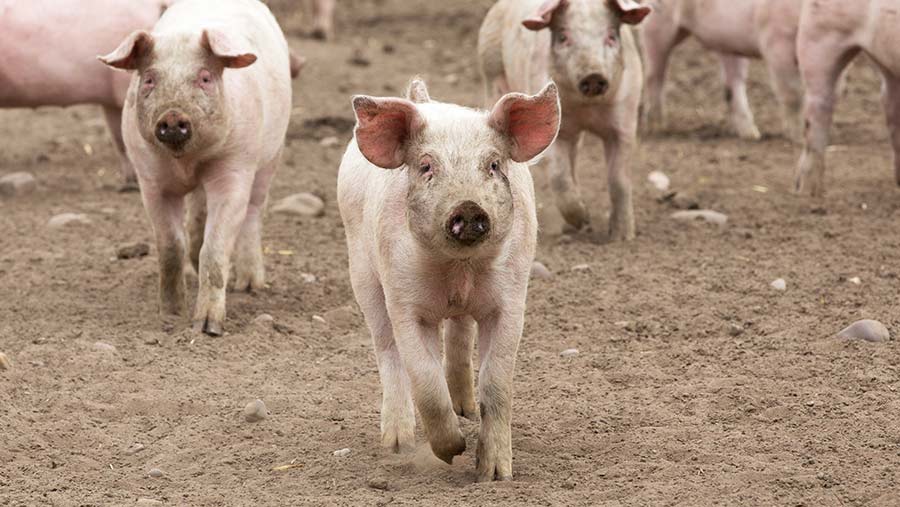British food and drink exports face 25% tariffs in $7.5bn US-EU trade war
 © Tim Scrivener
© Tim Scrivener The US government is set to impose $7.5bn (£6.1bn) worth of tariffs on EU and British food exports in an escalating trade war.
The dispute is over EU subsidies handed to aerospace giant Airbus which has manufacturing assets in France, Germany, Spain and the UK.
President Donald Trump claimed the subsidies contravened trade rules and has received WTO backing to impose the annual tariffs at a rate of 25%.
The UK is expected to shoulder a large part of the total, if tariffs are implemented on 18 October, as planned.
A wide range of British goods have been targeted by Mr Trump’s administration including:
- Pork
- Cheese
- Yoghurt
- Butter
- Biscuits
- Wool products
- Fruit
- Vegetables
- Whisky
See also: Trump lays out huge $16bn bailout for farmers
According to the National Pig Association (NPA), the US is Britain’s second biggest non-EU pigmeat customer after China.
In the first seven months of 2019, the UK exported 6,768t of pork to the US and the tariffs will add unwelcome costs to British producers, the NPA said.
Scottish whisky is also targeted in what is being seen as a tit-for-tat move following EU tariffs on US bourbon last year.
The Trump tariff will be imposed on single-malt whiskies produced in Scotland, which account for about £370m of the total £1.2bn of exports to the US each year.
The industry supports hundreds of Scottish barley growers and NFU Scotland (NFUS) has voiced concern about the potential implications.
The union’s combinable crops chairman, Ian Sands, said spring malting barley is the biggest crop grown in Scotland and a key ingredient for the whisky industry.
“Last year, maltsters bought almost 850,000t of Scottish malting barley, 96% of which was spring barley, and equivalent to the production from about 150,000ha,” Mr Sands said.
“Given that the US is the biggest single market for Scotch whisky, it is imperative that these damaging tariff proposals are scrapped and taken off the table in the next few weeks,” he warned.
NFUS pigs committee chairman Jamie Wyllie added: “This looks like bad news for the Scottish pig industry. Exports from the UK to the US are almost entirely fresh pork, but most of it is top-end, high-value, high-welfare and outdoor-reared.”
Mr Wyllie suggested that although export volumes to the US accounted for only 5% of total pork exports, the value would be disproportionately higher because of its quality.
“The main companies involved in trading with the US are major players in Scotland and a genuine concern is that, without the trade dispute being de-escalated, demand for antibiotics-free, outdoor-bred pigs and pig prices in general could be affected.”
The dairy sector will also be hit and time and effort in establishing markets for specialist cheese could now be wasted, according to NFUS dairy policy manager Stuart Martin
“Time, money and effort has been invested in establishing high-value, branded markets for Scottish cheese to North America.
“Driven by the Scottish Dairy Growth Board [SDGB], the attributes of country of origin, brand story and unique points of difference have been of critical importance in opening the door to the target cheese consuming nations such as the US.”
Meanwhile, the Department for International Trade (DfIT) said it was working to defuse the situation.
“The UK government is clear that resorting to tariffs is not in the interests of the UK, EU or US,” a DfIT spokesman said.
“We are working closely with the US, EU and European partners to support a negotiated settlement.
“We are also seeking confirmation from the WTO that the UK has complied fully with WTO rulings regarding support to Airbus, and should not be subject to tariffs,” the spokesman added.
European farm and farm co-op body Copa- Cogeca general secretary Pekka Pesonen said: “We deeply regret that the agricultural sector is once again paying the bill for a political decision on trade that has nothing to do with agriculture.
“Creating volatility in international trade could be short-sighted and counterproductive – not only for international trade, but also regarding the key challenges that EU and US farming communities will have to face in the fight against climate change, food security and generational renewal.
“Farmers on both sides of the Atlantic need stability and trust in order to make long-term investments to remain competitive and attractive. We call on decision-makers to create a more predictable trade environment, for the benefit of the farming community and consumers across the world.”
